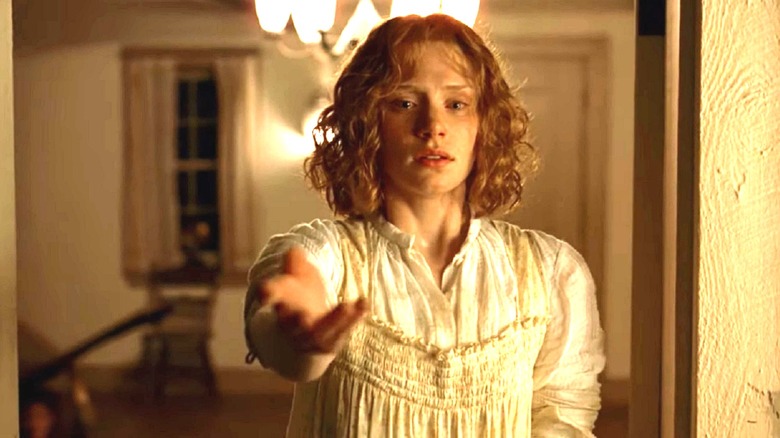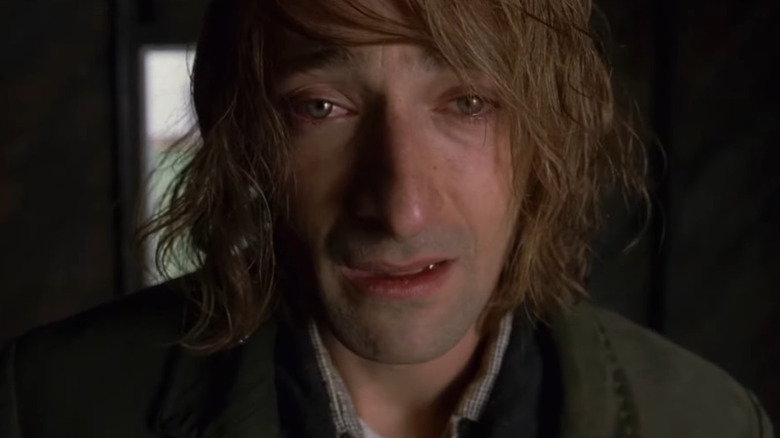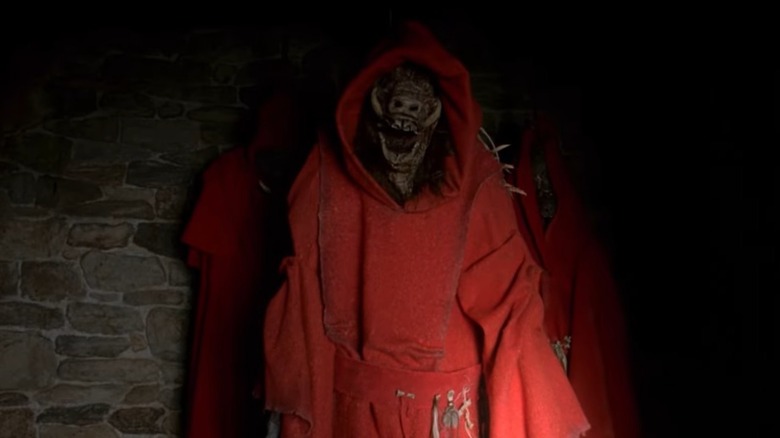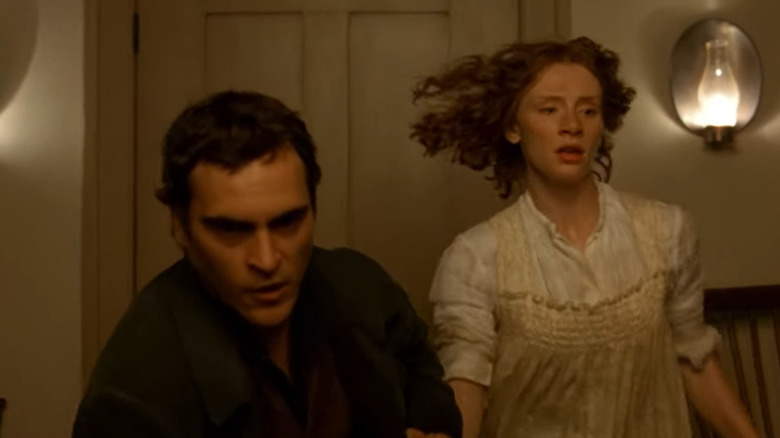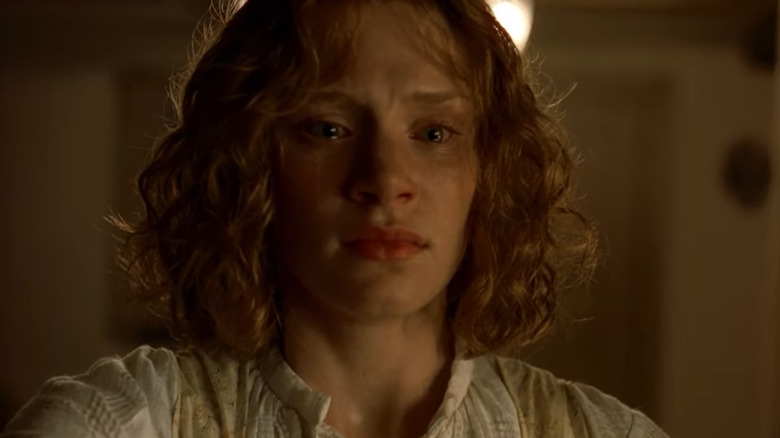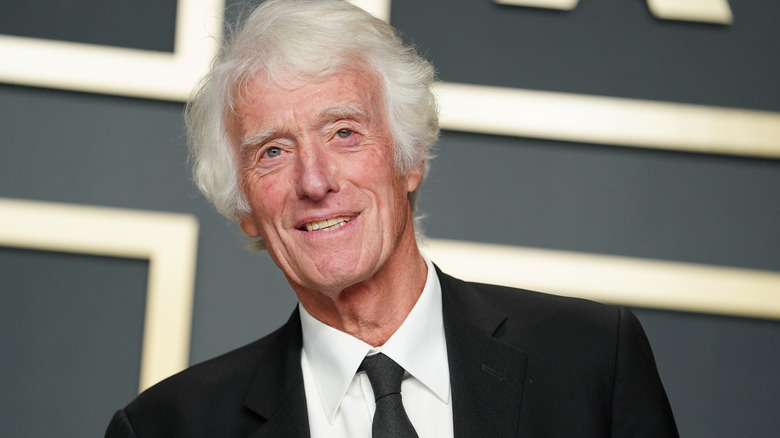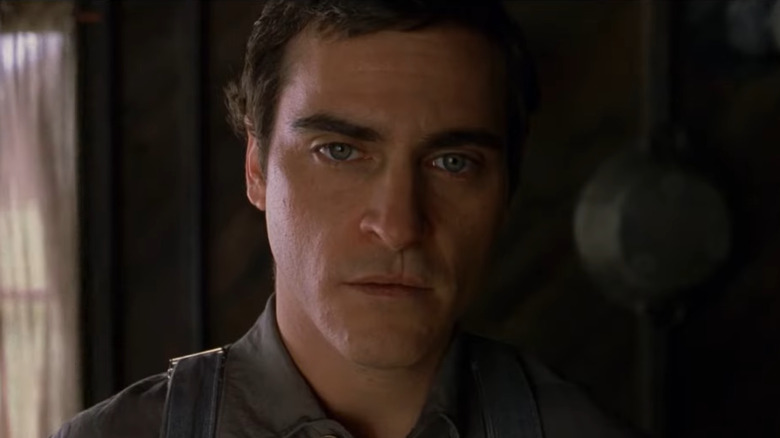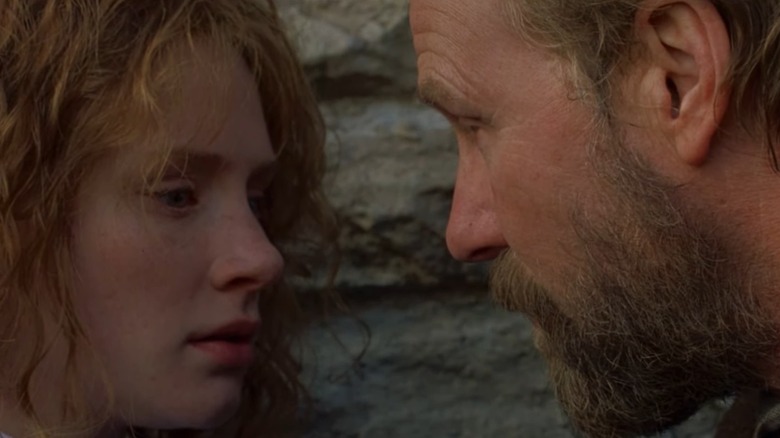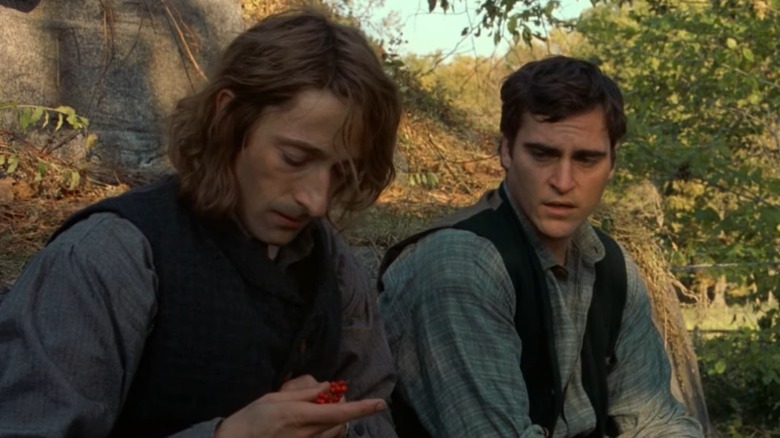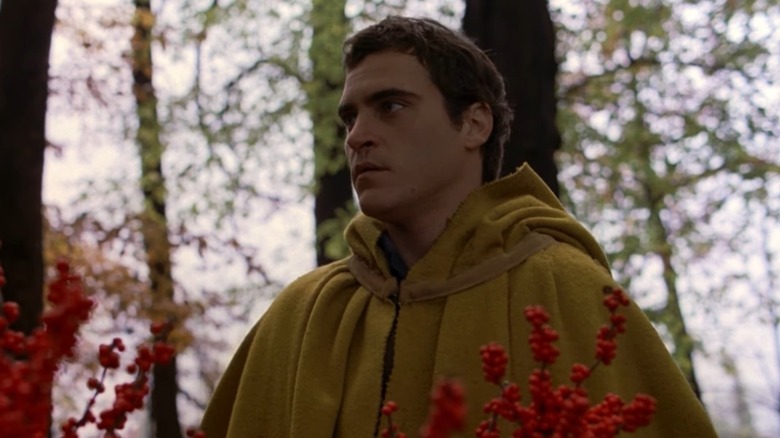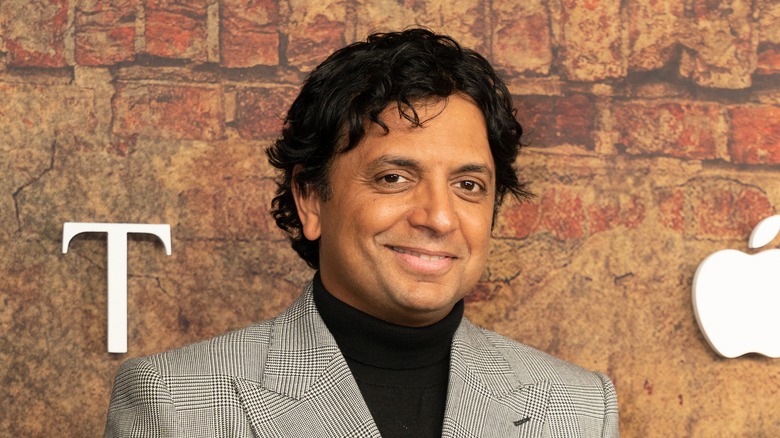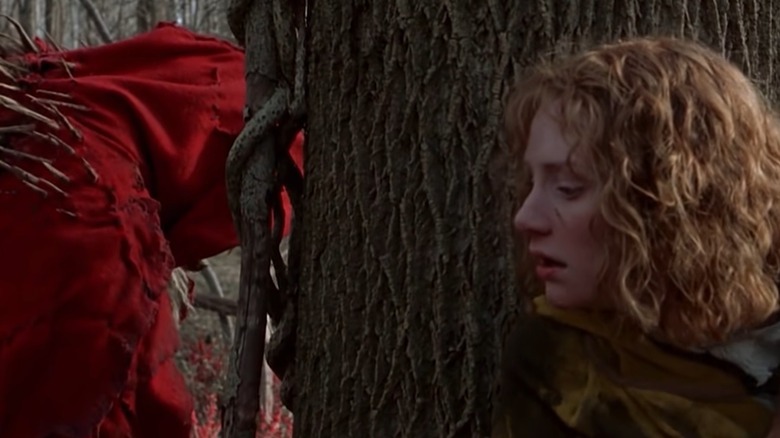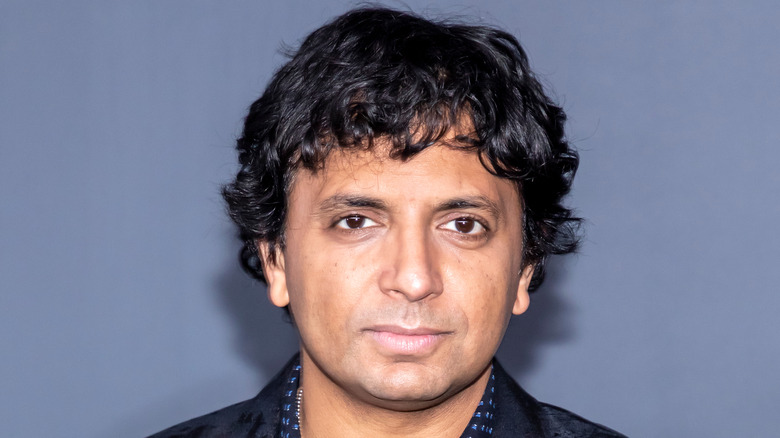The Village: Facts About M. Night Shyamalan's Most Misunderstood Film
In 2004, M. Night Shyamalan once again proved to the world he's more of an auteur than a filmmaker with the release of "The Village." On the surface, it looks like the story of a village trying to keep safe from the unknown and dangerous monsters in the woods; however, in typical Shyamalan fashion, there's a twist in the tale. This time, though, it wasn't as well-received by critics and audiences as "The Sixth Sense" or "Unbreakable," as the film only garnered a 43% critical approval and 57% audience rating on Rotten Tomatoes.
There was a general perception that Shyamalan's twist was too radical and changed the entire genre of the film, not being what had been promoted. In the years since the release, most people have warmed to "The Village" and accepted it was the preconceived notions of what it should be that harmed the reception towards the movie. Like other Shyamalan features, there was a powerful message behind the story that begged to be unpacked, but the general audience failed to realize it until the dust had settled and the themes could percolate.
Time is the great equalizer, though, and the fact many people are still talking about this film to this day proves its relevance in the almanacs of cinema. Some even herald it as Shyamalan's best movie. So, let's take a wander and discover the wonder of M. Night Shyamalan's "The Village."
There was a lot of secrecy around The Village
In the age of the Internet, keeping a secret is almost as difficult as finding the right film to watch on Netflix in the evening. Franchises like "Star Wars" and the Marvel Cinematic Universe do everything in their power to preserve the integrity of their installments by forcing the actors to sign ironclad NDAs. In some cases, the actors only receive partial scripts to ensure plot twists or story details aren't leaked out ahead of time. This isn't a novel idea, though, as M. Night Shyamalan was doing something similar with his films decades earlier. Since his pictures often rely on an unexpected twist catching the audience by surprise, he has tried to maintain a high level of secrecy around his projects, including "The Village."
At a roundtable event (via IGN), Adrien Brody, who plays Noah Percy in the film, revealed how intense the confidentiality around "The Village" really was. "Night swore me to secrecy first of all," he said. "And I think Night even hesitated at me seeing the script if I wasn't going to do the movie. And Night made me promise not to show the script to anyone, including my representatives. So, my agents didn't even read the script." Brody explained how he stayed true to his promise to Shyamalan and didn't mention anything about the film to even his family, as he went about preparing for his role in hushed privacy.
A version of the script leaked very early
As someone who tried to maintain the secrecy surrounding "The Village," especially due to its juicy twist that upsets the apple cart, M. Night Shyamalan's worst nightmare came to fruition. As per Tor, an early version of the script leaked in 2003. Even though the world of social media was still in its infancy and Film Twitter couldn't chime in with its many expert opinions, several entertainment websites covered the news and even provided reviews of the script before the movie hit theaters. Ain't It Cool News famously called it Shyamalan's "Showgirls" or "Battlefield Earth," fearing it may total his film career.
There were changes made to "The Village" after the leak — such as the title since it was still known as "The Woods" in that version — but it was too late to change the meat and potatoes of the film. The twist was out there, and there was nothing anyone could do about it. While it might have been unfortunate and disappointing for Shyamalan and all those who worked on the production, it was far from a box office-sinking disaster, as the film still raked in $256.7 million from a $60 million budget. Also, it wasn't like an early copy of the actual film leaked early like "X-Men Origins: Wolverine" did in 2009.
M. Night Shyamalan envisioned The Village as a period romance
From the trailers, ambiance, and general euphoria surrounding "The Village," most viewers expected to watch a horror or thriller in the same vein as "Signs" or "The Sixth Sense." The film appeared creepy and unsettling, as the threat of monsters in the woods loomed large. Maybe the monster would have been a wendigo? Or perhaps it was an otherworldly being? M. Night Shyamalan never viewed the film in this way at all, though. In fact, his intention wasn't to write horror at all.
Speaking to Glide Magazine, Shyamalan said, "I wanted to write a romance, a period romance. I wanted to go back to the 1890s where people believed in love." The writer-slash-director revealed how setting a story in this era forced him to change his style of writing as he had to omit many of the sarcastic undertones found in his other work. He added how there was an earnest sincerity to characters from this period, as they often said what they truly meant and were genuine about it.
M. Night Shyamalan cast Bryce Dallas Howard after seeing her in a play
While Bryce Dallas Howard may now be an A-list Hollywood star, having starred in the "Jurassic World" franchise, as well as "Terminator Salvation" and "Spider-Man 3," she was a relative unknown when she was cast as Ivy Walker in "The Village." If someone didn't know she was Ron Howard's daughter back then, they would have simply seen her as another upcoming starlet trying to make their way through showbiz. Howard herself was surprised that M. Night Shyamalan picked her to appear in his film, as she revealed to Fast Company.
At the time, Howard was appearing in a theater production when she saw Shyamalan seated in the audience. After the show, they formally met each other. A few weeks later, she received an invitation to meet with him for lunch where he offered her the lead role in "The Village."
In a conversation with Glide Magazine, Shyamalan confirmed the story. He explained how he tends to follow instinctual feelings about actors, and he felt the same way about Howard. She didn't even need to audition for the part before he offered it to her.
The cinematographer said the director was incredibly precise and deliberate
Roger Deakins is one of the most celebrated cinematographers in film history. Throughout his career, he has rubbed shoulders with iconic directors such as the Coen brothers, Ron Howard, Frank Darabont, and Martin Scorsese. Yet, even he found the experience of working with M. Night Shyamalan on "The Village" to be different from anything else before it.
In an interview with Uproxx, Deakins compared the differing methods of the Coen brothers compared to Shyamalan. The cinematographer explained how the Coens would treat storyboards as flexible blueprints for the film. While the plan for scenes was laid out beforehand, they weren't afraid to try something new and change it up on the day of shooting. However, Shyamalan wasn't like that at all.
"Whereas M. Night on 'The Village,' that was it," Deakins said. "That was the shot. If the actor wanted to change it, 'No, that's the shot.' I can understand it, and I didn't find it frustrating at all, actually. But I do find it a little bit restrictive." That said, Deakins was left impressed by Shyamalan's incredible level of detail and enjoyed working on the film with him.
Joaquin Phoenix said the chatter of actors doing a boot camp was slightly inaccurate
Leading up to the release of "The Village," the film's production notes mentioned how M. Night Shyamalan had taken the actors to a boot camp to prepare for their roles. Naturally, it became a talking point among the press, as everyone wanted to find out what sort of drills or exercises the actors had been put through. Of course, this film wasn't "Full Metal Jacket," but there must have been a reason for Shyamalan wanting the actors to undergo this preparation.
Joaquin Phoenix, who plays Lucius Hunt in the film, disputed the accuracy of calling it a boot camp when he spoke to Phase9 Entertainment. He explained how it was merely an opportunity for the actors to meet and work on their characters without distraction from the outside world. Phoenix even denied a claim he went into the woods by himself to get over a fear of the dark; however, he admitted he went along with it when asked about it in interviews at first.
"I went into the woods with Adrien [Brody] and this kid Fran [Kranz] to sleep there one night," he said. "They sent me to get wood and when I came back they were gone. I sat around waiting, and suddenly sticks would fly at me from the dark and there were some noises. That was really the extent of it. It was like junior high pranks, not me facing my fear."
Bryce Dallas Howard said William Hurt stayed longer on set for her
In "The Village," Bryce Dallas Howard plays Ivy, the daughter of Edward Walker, who is portrayed by the late William Hurt. As father and daughter, the two had to build a believable relationship onscreen, and their closeness extended long after the cameras stopped rolling as well. After Hurt passed away in March 2022, Howard posted a special message about her co-star on social media (via People).
Not only did she reserve praise for Hurt as an exceptional and talented performer, but she also shared an interesting bit of trivia from their time together on "The Village." Howard revealed how Hurt had finished all his scenes before her, but he still stayed at Sweetwater Farm to support her while she continued to film. "The Village" was Howard's first major role in a film, so this kindness must have meant a great deal to her at the time and stuck with her ever since.
How Wuthering Heights led to The Village
Following M. Night Shyamalan's career, it's clear that he charts his own path in the film industry. He makes the movies he wants to make and remains highly selective about the projects he boards. After a hat trick of successes in the form of "The Sixth Sense," "Unbreakable," and "Signs," he became a hot commodity in Hollywood and had several offers flung his way. In fact, if he had taken one of them, "The Village" may never have happened.
At a Q&A session promoting "The Village" (via IGN), Shyamalan revealed the following: "[A studio] offered me 'Wuthering Heights,' with these two amazing actors ... I read the book again, I was like, 'This is the greatest book ever!' No to the movie, but I'm gonna write my own period piece." The filmmaker also explained how "King Kong" played an influence in shaping the story, as he found it fascinating how people tried to go about their day-to-day lives in normality while there was a known monster stomping around and scaring them.
In terms of "Wuthering Heights," there were two film versions released around this period — none helmed by Shyamalan. The first was a 2003 MTV film directed by Suri Krishnamma and starring Erika Christensen and Mike Vogel. The second was a 2011 adaptation directed by Andrea Arnold and starred Kaya Scodelario and James Howson.
The claims of similarity
The entertainment industry often has to contend with serious plagiarism claims. In some instances, the authors have merit in their arguments about their material being unfairly used without proper compensation or a signed agreement, while there are other times when the coincidences between the properties are like two loose straws dancing in the wind and occasionally touching. "The Village" and M. Night Shyamalan had to deal with their own set of allegations when the film was released.
As per The New York Times, author Margaret Peterson Haddix claimed a similarity between her 1995 novel "Running Out of Time" and "The Village" — particularly in terms of the twist ending. Haddix and her publisher Simon & Schuster Children's Publishing considered their decision and options, but no known lawsuit was ever filed against Shyamalan or Disney. Speaking on behalf of the studio and Shyamalan, then-Buena Vista Pictures Senior VP for Publicity Dennis Rice denied the claims made by Haddix.
The three Hollywood rules that M. Night Shyamalan broke in the movie
There's a debate among artists if rules help or hamper the creative process. However, in the movie industry — especially the Hollywood system — there are set rules that filmmakers need to abide by if they want their pictures released to the masses. There are only a handful of directors who are able to get away with doing their own thing due to their reputation in the marketplace, and M. Night Shyamalan is one of them.
In an interview with The Washington Post before the release of "The Village," he stated that the 2004 movie was the biggest rulebreaker of his filmography at that point in time. There were three big rules that he broke, according to the Hollywood blockbuster system then. The first was the choice of big-name star power or special effects — Shyamalan decided to keep the film small with established names (but not superstars) and to use practical effects. The second was in terms of a female lead, as Shyamalan bucked the Hollywood trend to focus on a male protagonist and chose Ivy as the main character for the film. The third and final rule was to do with flashbacks, as Shyamalan chose to tell his story in his own way and not in a mandated manner.
How Bryce Dallas Howard prepared for the role of Ivy
Speaking to the BBC, Bryce Dallas Howard stressed that blindness wasn't the sole factor that defined her character Ivy in "The Village" — and there was much more to her to explore as a performer. However, since Howard didn't know what it was like to be visually impaired, she sought assistance from the organization known as The Lighthouse to adequately prepare for the role.
She explained how the foundation analyzed the script and answered questions she may have about Ivy. Afterward, Howard underwent her own specific preparation to get ready for the production. "I decided to spend a large majority of every day blindfolded because after wearing a blindfold for 90 minutes your brain starts to rewire itself," she said. "So that was my rule: no less than 90 minutes." In the same interview, Howard explained how she was cast in May 2003 and the production started in October, so there wasn't a wealth of time for preparation.
M. Night Shyamalan believes The Village's marketing hurt the film
It isn't uncommon for critics and fans to change their minds about films they hated or disliked initially. It could be a case of the movie being ahead of its time, or it simply arrived and caught the audience off guard. "The Village" falls into both these categories, as most people have warmed up to it over the years. Looking back at what may have harmed the film's kneejerk reception upon release, M. Night Shyamalan conceded the marketing didn't do it any favors.
Speaking to Yahoo, he explained how the audience may have a certain notion going into a film due to the marketing campaign. For example, someone could be anticipating a terrifying film, and their expectations are subverted if it turns out to be a drama. It might end up being a welcome surprise to some and disappoint others who felt they didn't get what they were sold in the first place. Shyamalan acknowledged how the experience of "The Village" did change how he marketed his films going forward, as he is now more cautious of how his movies are promoted.
